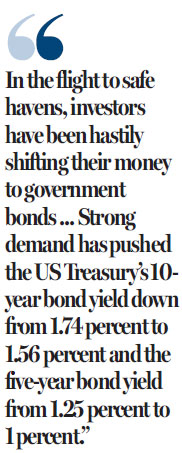The pain lingers on after Brexit, but for how long?
Updated: 2016-06-29 08:34
(HK Edition)
|
|||||||||
As widely expected, the UK's vote to leave the European Union (EU), or Brexit, has thrown global investment markets into disarray. Following Monday's fall, Hong Kong's benchmark Hang Seng Index sank below the psychological 20,000-point level in early trading on Tuesday.
Monday's sell-off in New York, which sent the Dow Jones down 1.5 percent to close at 17,140.24, was expected to continue on Tuesday. Hardest hit were the banks, with Bank of America and JPMorgan Chase & Co falling 6.31 percent and 3.34 percent, respectively, while Citigroup was down 4.52 percent.
In Hong Kong, HSBC, which is headquartered in London and has extensive exposure in European markets, has taken a beating.
In the flight to safe havens, investors have been hastily shifting their money to government bonds, the Japanese yen, the Swiss franc and gold. Strong demand has pushed the US Treasury's 10-year bond yield down from 1.74 percent to 1.56 percent and the five-year bond yield from 1.25 percent to 1 percent, while the price of gold rose nearly 5 percent to $1,320 an ounce on Friday.

Some analysts have maintained that, in these uncertain times, cash is king. Unsurprisingly, the value of those "strong" currencies, including the US dollar, the Japanese yen and the Swiss franc, has appreciated against most other major currencies. As a result, the Hong Kong dollar has also strengthened in tandem with the greenback because of the linked exchange rate system.
Though safe from any upheaval stemming from Brexit, keeping cash has its downside. The cost of forex (foreign exchange) transactions can more than offset the meager returns at a time of exceptionally low interest rates.
The Japanese government has introduced negative interest rates in a desperate attempt to stimulate economic growth, while the Swiss government is trying to fend off the influx of hot money into the banking system.
Before Britain voted to leave the EU last Friday, many traders had expected the US Federal Reserve (Fed) to raise interest rates at its July meeting. Now, all bets are off and there's talk that the Fed might consider lowering rather than raising the cost of money after Brexit.
The situation is really that bad.
(HK Edition 06/29/2016 page1)